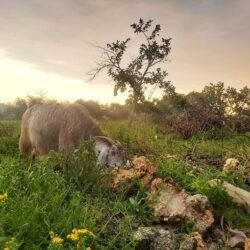Also included is an audio recording of Ān Tiċċen, and transliterations of the lyrics into reconstructed IPA and into Hebrew script (along with a chart to explain the orthography of the Hebrew).
| Source (Aramaic) | Translation (Old English) | Hebraization (Judeo-Old English) | Romanization (reconstructed IPA) | Translation (English) |
|---|---|---|---|---|
חַד גַּדְיָא, חַד גַּדְיָא. דְּזַבִּן אַבָּא בִּתְרֵי זוּזֵי, חַד גַּדְיָא, חַד גַּדְיָא. |
ān tiċċen, ān tiċċen, þe bohte hit mīn fæder ƿiþ tƿām sċillingum, ān tiċċen, ān tiċċen |
אָן טִקֵﬞן, אָן טִקֵﬞן תֵֿבֹּחטֵי הִט מִין פַדֶּר גִﬞדֿ טגָﬞאם שִׁלִּעﬞגּוּם אָן טִקֵﬞן, אָן טִקֵﬞן |
ɑːn ˈtitt͡ʃen | ɑːn ˈtitt͡ʃen θe ˈboxte hit miːn ˈfæder wið twɑːm ˈʃiɫɫiŋɡum ɑːn ˈtitt͡ʃen | ɑːn ˈtitt͡ʃen |
One little goat, one little goat, that my father had bought with two shillings one little goat, one little goat. |
וְאָתָא שֻׁנְרָא וְאָכְלָה לְגַדְיָא, דְּזַבִּן אַבָּא בִּתְרֵי זוּזֵי, חַד גַּדְיָא, חַד גַּדְיָא. |
ond cōm sē catt ond ǣt þæt tiċċen þe bohte hit mīn fæder ƿiþ tƿām sċillingum, ān tiċċen, ān tiċċen |
אֹנדּ קוֹם סֵי קָאט אֹנדּ אַאט תַֿט טִקֵﬞן תֵֿבֹּחטֵי הִט מִין פַדֶּר גִﬞדֿ טגָﬞאם שִׁלִּעﬞגּוּם אָן טִקֵﬞן, אָן טִקֵﬞן |
ond koːm seː kɑtː ond æːt θæt ˈtitt͡ʃen θe ˈboxte hit miːn ˈfæder wið twɑːm ˈʃiɫɫiŋɡum ɑːn ˈtitt͡ʃen | ɑːn ˈtitt͡ʃen |
Then came the cat and ate the little goat, that my father had bought with two shillings, one little goat, one little goat. |
וְאָתָא כַּלְבָּא וְנָשַׁךְ לְשֻׁנְרָא, דְּאָכְלָה לְגַדְיָא, דְּזַבִּן אַבָּא בִּתְרֵי זוּזֵי, חַד גַּדְיָא, חַד גַּדְיָא. |
ond cōm sē hund ond bāt þone catt þe ǣt þæt tiċċen þe bohte hit mīn fæder ƿiþ tƿām sċillingum, ān tiċċen, ān tiċċen |
אֹנדּ קוֹם סֵי הֻנדּ אֹנדּ בָּאט תֹֿנֵא קָאט תֵֿאַאט תַֿט טִקֵﬞן תֵֿבֹּחטֵי הִט מִין פַדֶּר גִﬞדֿ טגָﬞאם שִׁלִּעﬞגּוּם אָן טִקֵﬞן, אָן טִקֵﬞן |
ond koːm seː hund ond bɑːt ˈθone kɑtː θe æːt θæt ˈtitt͡ʃen θe ˈboxte hit miːn ˈfæder wið twɑːm ˈʃiɫɫiŋɡum ɑːn ˈtitt͡ʃen | ɑːn ˈtitt͡ʃen |
Then came the dog and bit the cat, that had eaten the little goat, that my father had bought with two shillings, one little goat, one little goat. |
וְאָתָא חֻטְרָא וְהִכָּה לְכַלְבָּא, דְּנָשַׁךְ לְשֻׁנְרָא, דְּאָכְלָה לְגַדְיָא, דְּזַבִּן אַבָּא בִּתְרֵי זוּזֵי, חַד גַּדְיָא, חַד גַּדְיָא. |
ond cōm sē stæf ond slōg þone hund þe bāt þone catt þe ǣt þæt tiċċen þe bohte hit mīn fæder ƿiþ tƿām sċillingum, ān tiċċen, ān tiċċen |
אֹנדּ קוֹם סֵי סטַף אֹנדּ סלוֹח תֹֿנֵא הֻנדּ תֵֿבָּאט תֹֿנֵא קָאט תֵֿאַאט תַֿט טִקֵﬞן תֵֿבֹּחטֵי הִט מִין פַדֶּר גִﬞדֿ טגָﬞאם שִׁלִּעﬞגּוּם אָן טִקֵﬞן, אָן טִקֵﬞן |
ond koːm seː stæf ond sloːx ˈθone hund θe bɑːt ˈθone kɑtː θe æːt θæt ˈtitt͡ʃen θe ˈboxte hit miːn ˈfæder wið twɑːm ˈʃiɫɫiŋɡum ɑːn ˈtitt͡ʃen | ɑːn ˈtitt͡ʃen |
Then came the stick, and struck the dog, that had bitten the cat, that had eaten the little goat, that my father had bought with two shillings, one little goat, one little goat. |
וְאָתָא נוּרָא וְשָׂרַף לְחֻטְרָא, דְּהִכָּה לְכַלְבָּא, דְּנָשַׁךְ לְשֻׁנְרָא, דְּאָכְלָה לְגַדְיָא, דְּזַבִּן אַבָּא בִּתְרֵי זוּזֵי, חַד גַּדְיָא, חַד גַּדְיָא. |
ond cōm þæt fȳr ond bærnde þone stæf þe slōg þone hund þe bāt þone catt þe ǣt þæt tiċċen þe bohte hit mīn fæder ƿiþ tƿām sċillingum, ān tiċċen, ān tiċċen |
אֹנדּ קוֹם תַֿט פֻֿוִיר אֹנדּ בַּרנדֵּא תֹֿנֵא סטַף תֵֿסלוֹח תֹֿנֵא הֻנדּ תֵֿבָּאט תֹֿנֵא קָאט תֵֿאַאט תַֿט טִקֵﬞן תֵֿבֹּחטֵי הִט מִין פַדֶּר גִﬞדֿ טגָﬞאם שִׁלִּעﬞגּוּם אָן טִקֵﬞן, אָן טִקֵﬞן |
ond koːm θæt fyːr ond ˈbærˠnde ˈθone stæf θe sloːx ˈθone hund θe bɑːt ˈθone kɑtː θe æːt θæt ˈtitt͡ʃen θe ˈboxte hit miːn ˈfæder wið twɑːm ˈʃiɫɫiŋɡum ɑːn ˈtitt͡ʃen | ɑːn ˈtitt͡ʃen |
Then came the fire, and burned up the stick, that had struck the dog, that had bitten the cat, that had eaten the little goat, that my father had bought with two shillings, one little goat, one little goat. |
וְאָתָא מַיָּא וְכָבָה לְנוּרָא, דְּשָׂרַף לְחֻטְרָא, דְּהִכָּה לְכַלְבָּא, דְּנָשַׁךְ לְשֻׁנְרָא, דְּאָכְלָה לְגַדְיָא, דְּזַבִּן אַבָּא בִּתְרֵי זוּזֵי, חַד גַּדְיָא, חַד גַּדְיָא. |
ond cōm þæt ƿæter ond cƿencte þæt fȳr þe bærnde þone stæf þe slōg þone hund þe bāt þone catt þe ǣt þæt tiċċen þe bohte hit mīn fæder ƿiþ tƿām sċillingum, ān tiċċen, ān tiċċen |
אֹנדּ קוֹם תַֿט גַﬞטֵר אֹנדּ קוֵנקטֵא תַֿט פֻֿוִיר תֵֿבַּרנדֵּא תֹֿנֵא סטַף תֵֿסלוֹח תֹֿנֵא הֻנדּ תֵֿבָּאט תֹֿנֵא קָאט תֵֿאַאט תַֿט טִקֵﬞן תֵֿבֹּחטֵי הִט מִין פַדֶּר גִﬞדֿ טגָﬞאם שִׁלִּעﬞגּוּם אָן טִקֵﬞן, אָן טִקֵﬞן |
ond koːm θæt ˈwæter ond ˈkwenkte θæt fyːr θe ˈbærˠnde ˈθone stæf θe sloːx ˈθone hund θe bɑːt ˈθone kɑtː θe æːt θæt ˈtitt͡ʃen θe ˈboxte hit miːn ˈfæder wið twɑːm ˈʃiɫɫiŋɡum ɑːn ˈtitt͡ʃen | ɑːn ˈtitt͡ʃen |
Then came the water, and quenched the fire, that had burned up the stick, that had struck the dog, that had bitten the cat, that had eaten the little goat, that my father had bought with two shillings, one little goat, one little goat. |
וְאָתָא תּוֹרָא וְשָׁתָא לְמַיָּא, דְּכָבָה לְנוּרָא, דְּשָׂרַף לְחֻטְרָא, דְּהִכָּה לְכַלְבָּא, דְּנָשַׁךְ לְשֻׁנְרָא, דְּאָכְלָה לְגַדְיָא, דְּזַבִּן אַבָּא בִּתְרֵי זוּזֵי, חַד גַּדְיָא, חַד גַּדְיָא. |
ond cōm þæt hrīþer ond dranc þæt ƿæter þe cƿencte þæt fȳr þe bærnde þone stæf þe slōg þone hund þe bāt þone catt þe ǣt þæt tiċċen þe bohte hit mīn fæder ƿiþ tƿām sċillingum, ān tiċċen, ān tiċċen |
אֹנדּ קוֹם תַֿט הרִידֵֿר אֹנדּ דּרָעﬞק תַֿט גַﬞטֵר תֵֿקוֵנקטֵא תַֿט פֻֿוִיר תֵֿבַּרנדֵּא תֹֿנֵא סטַף תֵֿסלוֹח תֹֿנֵא הֻנדּ תֵֿבָּאט תֹֿנֵא קָאט תֵֿאַאט תַֿט טִקֵﬞן תֵֿבֹּחטֵי הִט מִין פַדֶּר גִﬞדֿ טגָﬞאם שִׁלִּעﬞגּוּם אָן טִקֵﬞן, אָן טִקֵﬞן |
ond koːm θæt ˈr̥iːðer ond drɒŋk θæt ˈwæter θe ˈkwenkte θæt fyːr θe ˈbærˠnde ˈθone stæf θe sloːx ˈθone hund θe bɑːt ˈθone kɑtː θe æːt θæt ˈtitt͡ʃen θe ˈboxte hit miːn ˈfæder wið twɑːm ˈʃiɫɫiŋɡum ɑːn ˈtitt͡ʃen | ɑːn ˈtitt͡ʃen |
Then came the bull, and drank the water, that had quenched the fire, that had burned up the stick, that had struck the dog, that had bitten the cat, that had eaten the little goat, that my father had bought with two shillings, one little goat, one little goat. |
וְאָתָא הַשּׁוֹחֵט וְשָׁחַט לְתוֹרָא, דְּשָׁתָא לְמַיָּא, דְּכָבָה לְנוּרָא, דְּשָׂרַף לְחֻטְרָא, דְּהִכָּה לְכַלְבָּא, דְּנָשַׁךְ לְשֻׁנְרָא, דְּאָכְלָה לְגַדְיָא, דְּזַבִּן אַבָּא בִּתְרֵי זוּזֵי, חַד גַּדְיָא, חַד גַּדְיָא. |
ond cōm sē flǣsċmangere ond ofsnāþ þæt hrīþer þe dranc þæt ƿæter þe cƿencte þæt fȳr þe bærnde þone stæf þe slōg þone hund þe bāt þone catt þe ǣt þæt tiċċen þe bohte hit mīn fæder ƿiþ tƿām sċillingum, ān tiċċen, ān tiċċen |
אֹנדּ קוֹם סֵי פֿלַאשׁמָעﬞגֵּרֵה אֹנדּ אֹפֿסנָאדֿ תַֿט הרִידֵֿר תֵֿדּרָעﬞק תַֿט גַﬞטֵר תֵֿקוֵנקטֵא תַֿט פֻֿוִיר תֵֿבַּרנדֵּא תֹֿנֵא סטַף תֵֿסלוֹח תֹֿנֵא הֻנדּ תֵֿבָּאט תֹֿנֵא קָאט תֵֿאַאט תַֿט טִקֵﬞן תֵֿבֹּחטֵי הִט מִין פַדֶּר גִﬞדֿ טגָﬞאם שִׁלִּעﬞגּוּם אָן טִקֵﬞן, אָן טִקֵﬞן |
ond koːm seː ˈflæːʃˌmɑŋɡere ond ofˈsnɑːð θæt ˈr̥iːðer θe drɒŋk θæt ˈwæter θe ˈkwenkte θæt fyːr θe ˈbærˠnde ˈθone stæf θe sloːx ˈθone hund θe bɑːt ˈθone kɑtː θe æːt θæt ˈtitt͡ʃen θe ˈboxte hit miːn ˈfæder wið twɑːm ˈʃiɫɫiŋɡum ɑːn ˈtitt͡ʃen | ɑːn ˈtitt͡ʃen |
Then came the slaughterer, and slaughtered the bull, that had drunk the water, that had quenched the fire, that had burned up the stick, that had struck the dog, that had bitten the cat, that had eaten the little goat, that my father had bought with two shillings, one little goat, one little goat. |
וְאָתָא מַלְאַךְ־הַמָּ֫וֶת וְשָׁחַט לְשׁוֹחֵט, דְּשָׁחַט לְתוֹרָא, דְּשָׁתָא לְמַיָּא, דְּכָבָה לְנוּרָא, דְּשָׂרַף לְחֻטְרָא, דְּהִכָּה לְכַלְבָּא, דְּנָשַׁךְ לְשֻׁנְרָא, דְּאָכְלָה לְגַדְיָא, דְּזַבִּן אַבָּא בִּתְרֵי זוּזֵי, חַד גַּדְיָא, חַד גַּדְיָא. |
ond cōm sē ǣrendgāst dēaþes ond ofsnāþ þone flǣsċmangere þe ofsnāþ þæt hrīþer þe dranc þæt ƿæter þe cƿencte þæt fȳr þe bærnde þone stæf þe slōg þone hund þe bāt þone catt þe ǣt þæt tiċċen þe bohte hit mīn fæder ƿiþ tƿām sċillingum, ān tiċċen, ān tiċċen |
אֹנדּ קוֹם סֵי אַארֵנדְּגָאסט דַּאָדֵֿס אֹנדּ אֹפֿסנָאדֿ תֹֿנֵא פֿלַאשׁמָעﬞגֵּרֵה תֵֿאֹפֿסנָאדֿ תַֿט הרִידֵֿר תֵֿדּרָעﬞק תַֿט גַﬞטֵר תֵֿקוֵנקטֵא תַֿט פֻֿוִיר תֵֿבַּרנדֵּא תֹֿנֵא סטַף תֵֿסלוֹח תֹֿנֵא הֻנדּ תֵֿבָּאט תֹֿנֵא קָאט תֵֿאַאט תַֿט טִקֵﬞן תֵֿבֹּחטֵי הִט מִין פַדֶּר גִﬞדֿ טגָﬞאם שִׁלִּעﬞגּוּם אָן טִקֵﬞן, אָן טִקֵﬞן |
ond koːm seː ˈæːrendˌɡɑːst ˈdæ͜ɑːðes ond ofˈsnɑːð ˈθone ˈflæːʃˌmɑŋɡere θe ofˈsnɑːð θæt ˈr̥iːðer θe drɒŋk θæt ˈwæter θe ˈkwenkte θæt fyːr θe ˈbærˠnde ˈθone stæf θe sloːx ˈθone hund θe bɑːt ˈθone kɑtː θe æːt θæt ˈtitt͡ʃen θe ˈboxte hit miːn ˈfæder wið twɑːm ˈʃiɫɫiŋɡum ɑːn ˈtitt͡ʃen | ɑːn ˈtitt͡ʃen |
Then came the Angel of Death, and slaughtered the butcher, that had slaughtered the bull, that had drunk the water, that had quenched the fire, that had burned up the stick, that had struck the dog, that had bitten the cat, that had eaten the little goat, that my father had bought with two shillings, one little goat, one little goat. |
וְאָתָא הַקָּדוֹשׁ־בָּרוּךְ־הוּא וְשָׁחַט לְמַלְאַךְ־הַמָּ֫וֶת דְּשָׁחַט לְשׁוֹחֵט, דְּשָׁחַט לְתוֹרָא, דְּשָׁתָא לְמַיָּא, דְּכָבָה לְנוּרָא, דְּשָׂרַף לְחֻטְרָא, דְּהִכָּה לְכַלְבָּא, דְּנָשַׁךְ לְשֻׁנְרָא, דְּאָכְלָה לְגַדְיָא, דְּזַבִּן אַבָּא בִּתְרֵי זוּזֵי, חַד גַּדְיָא, חַד גַּדְיָא. |
ond cōm sē hālga God ond ofsnāþ þone ǣrendgāst dēaþes þe ofsnāþ þone flǣsċmangere þe ofsnāþ þæt hrīþer þe dranc þæt ƿæter þe cƿencte þæt fȳr þe bærnde þone stæf þe slōg þone hund þe bāt þone catt þe ǣt þæt tiċċen þe bohte hit mīn fæder ƿiþ tƿām sċillingum, ān tiċċen, ān tiċċen |
אֹנדּ קוֹם סֵי הָאלְגָֿא גֹּדּ אֹנדּאֹפֿסנָאדֿ תֹֿנֵא אַארֵנדְּגָאסט דַּאָדֵֿס אֹנדּ אֹפֿסנָאדֿ תֹֿנֵא פֿלַאשׁמָעﬞגֵּרֵה תֵֿאֹפֿסנָאדֿ תַֿט הרִידֵֿר תֵֿדּרָעﬞק תַֿט גַﬞטֵר תֵֿקוֵנקטֵא תַֿט פֻֿוִיר תֵֿבַּרנדֵּא תֹֿנֵא סטַף תֵֿסלוֹח תֹֿנֵא הֻנדּ תֵֿבָּאט תֹֿנֵא קָאט תֵֿאַאט תַֿט טִקֵﬞן תֵֿבֹּחטֵי הִט מִין פַדֶּר גִﬞדֿ טגָﬞאם שִׁלִּעﬞגּוּם אָן טִקֵﬞן, אָן טִקֵﬞן |
ond koːm seː ˈhɑːɫ.ɣɑ ɡod ond ofˈsnɑːð ˈθone ˈæːrendˌɡɑːst ˈdæ͜ɑːðes θe ofˈsnɑːð ˈθone ˈflæːʃˌmɑŋɡere θe ofˈsnɑːð θæt ˈr̥iːðer θe drɒŋk θæt ˈwæter θe ˈkwenkte θæt fyːr θe ˈbærˠnde ˈθone stæf θe sloːx ˈθone hund θe bɑːt ˈθone kɑtː θe æːt θæt ˈtitt͡ʃen θe ˈboxte hit miːn ˈfæder wið twɑːm ˈʃiɫɫiŋɡum ɑːn ˈtitt͡ʃen | ɑːn ˈtitt͡ʃen |
Then came the blessed Holy One, and slaughtered the Angel of Death, that had slaughtered the butcher, that had slaughtered the bull, that had drunk the water, that had quenched the fire, that had burned up the stick, that had struck the dog, that had bitten the cat, that had eaten the little goat, that my father had bought with two shillings, one little goat, one little goat. |
This is the translation of Ḥad Gadya into Old English with a Hebraicization schema and reconstructed IPA by Isaac Gantwerk Mayer.
The earliest known appearance of “Ḥad Gadya,” by an unknown author, can be found, handwritten, in the Prague Haggadah (1526). The Aramaic has been vocalized according to the Prague Haggadah (1590). Besides the transcription of the Aramaic with its vocalization, I have also added a translation adapted from Eve Levavi Feinstein’s Passover Haggadah translation. –Aharon N. Varady
Click to access Judeo-Old-English-Orthography-Isaac-Gantwerk-Mayer-2024.pdf
Recordings

“חַד גַּדְיָא | Ān Tiċċen (אָן טִקֵﬞן) — an Old English translation of Ḥad Gadya by Isaac Gantwerk Mayer” is shared through the Open Siddur Project with a Creative Commons Attribution-ShareAlike 4.0 International copyleft license.









Leave a Reply